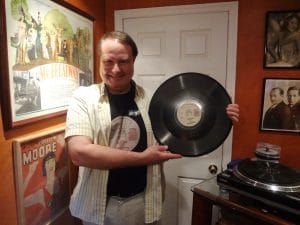While Hutchinson had a day job as a chemical engineer who worked in environmental health and safety, he’s much better known for his side hobby. In the 1920s and 1930s, Hollywood studios were making the switch from silent films to “talkies” — films with soundtracks. Led by Warner Bros., the predominant technology to have sound synchronized with the film being shown was Vitaphone, created by Bell Laboratories. The same motor that drove the film projector would drive a turntable with a phonograph record. To have enough space on the record for a full reel of film, the engineers slowed the rotation of the disk — to 33-1/3 rpm, which set the standard for future “extended play” records, and enlarged the disk to 16 inches. It worked, and the public instantly took to pictures with sound: Warner (and its sister studio, First National) made more than a thousand shorts and features between 1926 and 1931.

Hutchinson, who loved old films and music, hated that many of the old films were saved — but not their sound disks, effectively making them silent movies again. In 1991, he co-founded The Vitaphone Project in his home in Piscataway, N.J., to find the old sound track disks, match them to their films, and create a digital copy of both running together so they could be seen as they were originally intended. The early films not only included early work by big names like George Burns and Gracie Allen, Bob Hope, and Jack Benny, but also sometimes included the only recordings of early jazz and other music, comedy, and vaudeville acts. “We average several hundred new soundtrack discoveries a year,” he said in 2011 — it was a big undertaking. Warner Bros. has reissued many of the restored films on DVD, and the cable channel Turner Classic Movies ran a 24-hour marathon of Project’s results in 2016; proceeds helped fund more restorations. A restoration of one of Rose Marie’s earliest films, a 1929 short included with her Honorary Unsubscribe in 2017 (also embedded below), happened to have been the Project’s first effort. “When I first told her that we’d found the disc, she said to me that Jack Warner had told her it had been lost,” Hutchinson said in 2014. He showed it to her in 1994. Once it was over, “she looked at the screen, now blank, and said, ‘You know, the dress I wore was blue. And I was looking over at the side, where my mother was.’ All these memories came rushing back to her.” Hutchinson also hosted showings of his work at the Film Forum in Manhattan. “It was amazing stuff,” said Film Forum’s director of repertory programming, Bruce Goldstein. “He discovered vaudevillians who had been forgotten for years.” Hutchinson contracted colon cancer, and died on February 2, at 67.
“Baby Rose Marie” singing on camera in 1929, courtesy Hutchinson’s Vitaphone Project:
https://www.youtube.com/watch?v=3Q_Nxs_n7Zk
